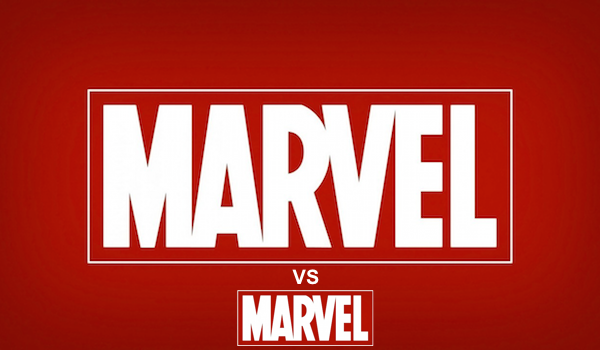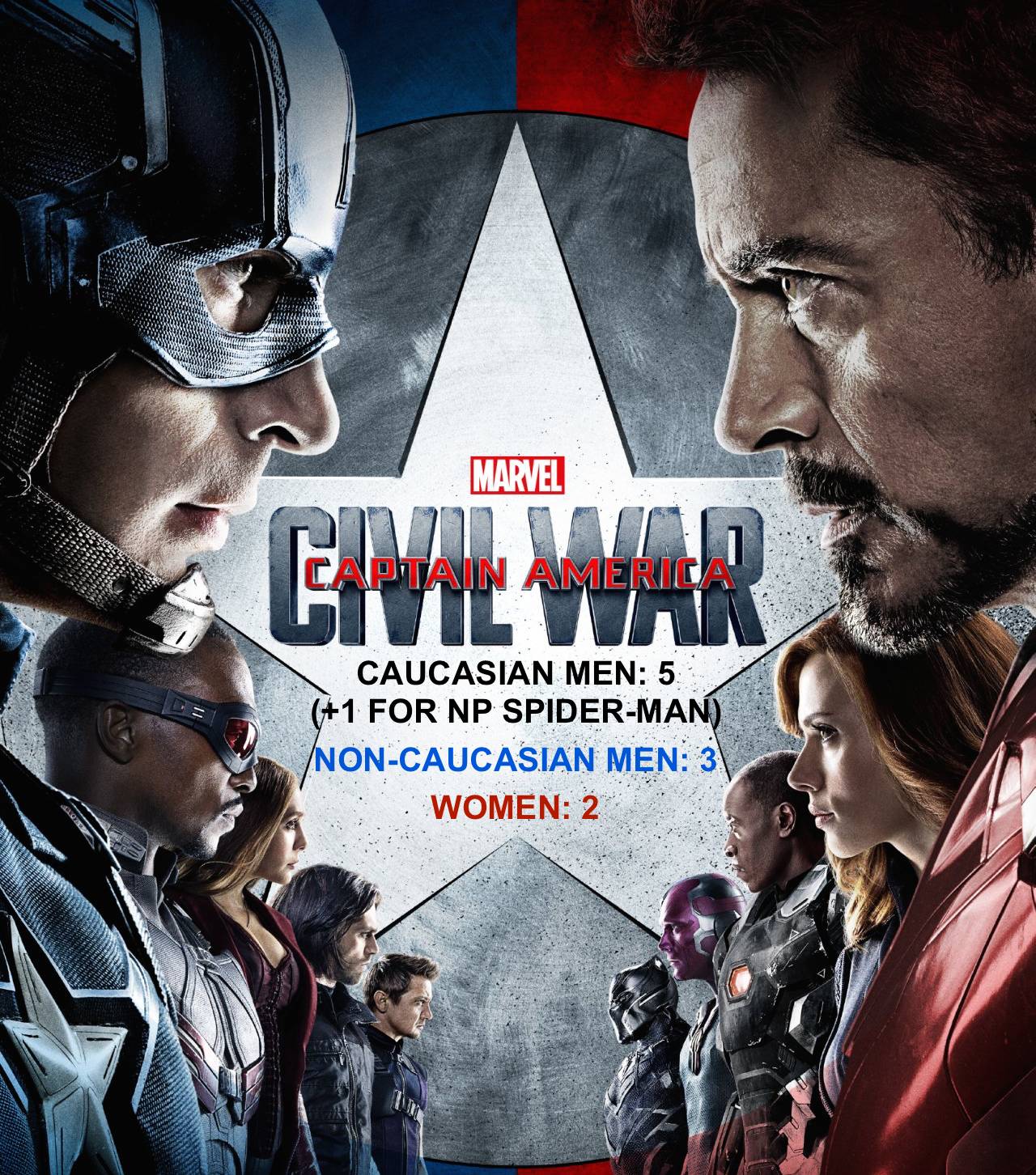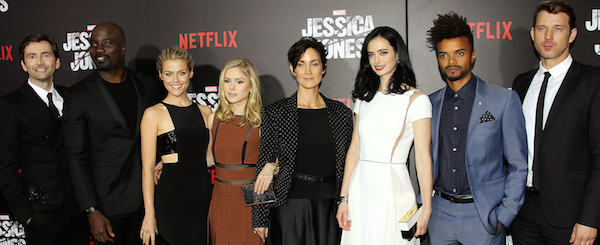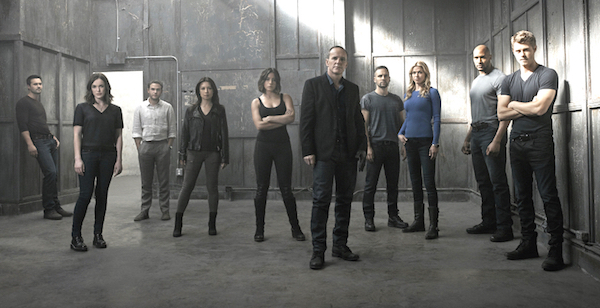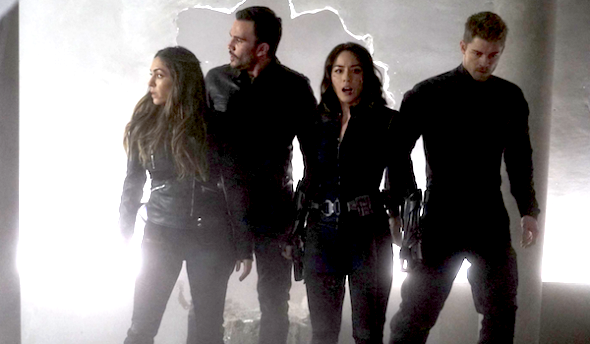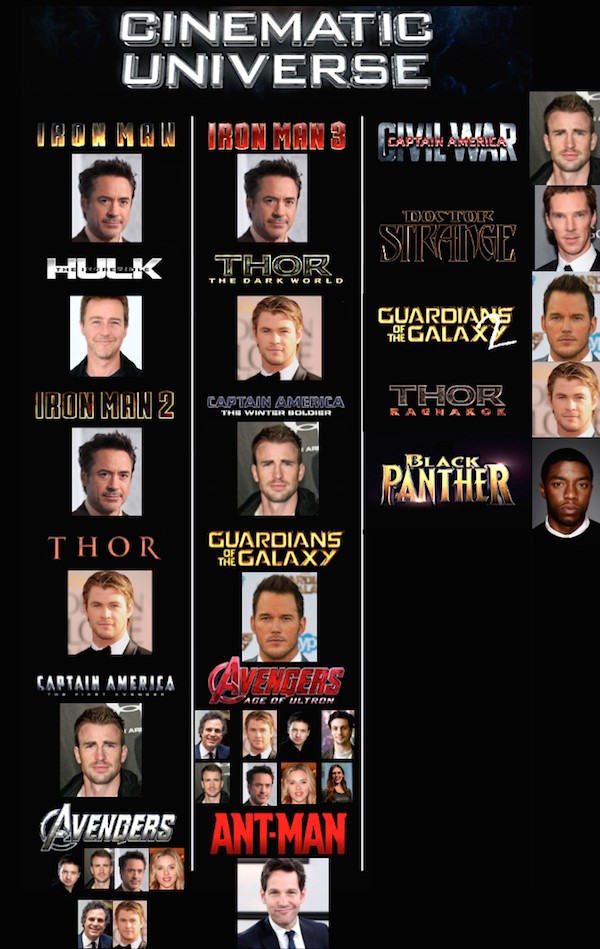With Captain America: Civil War dominating the box office and raking in a nauseating amount of money for Marvel and its parent-company Disney, it’s clear that the superhero genre is one that people won’t be tiring of anytime soon. Since 2008’s Iron Man, Marvel has had success after success with its ever-expanding film franchises as new and old fans flock to the theaters to see their favorite heroes battle with a seemingly endless list of foes. While DC, Marvel’s main competitor, has also begun to crank out these beloved hero flicks, they’ve yet to meet the quality and quantity of Marvel films.
Marvel has been releasing at least two films per year, with its Phase 3 schedule extending into 2020, and, perhaps most importantly, the company has been releasing at least two successful films per year. The company has yet to have a flop on its hands, due large in part to the fact that the, “It’s all connected,” motto links each of the standalones to the larger ensemble flicks in one way or another. Critics as well as fans have continued to sing Marvel praises, making it clear that the company is certainly #1 in the superhero franchise game.
Despite being at the top of the field (the alleged showdown between Batman V Superman: Dawn of Justice and Captain America: Civil War unsurprisingly ended with the latter winning in the eyes of critics and audiences alike) there is one thing that the MCU has almost embarrassingly dropped the ball on: diversity.
Gender diversity. Racial diversity. Diversity in nearly every regard.
With Captain America: Civil War (the twelfth MCU film since Iron Man) Marvel has managed to increase the number of its central black characters to a whopping three.
THREE.
Let’s give a slow-clap to Marvel for providing as many African American actors as white Chrises.
That was sarcasm by the way. Don’t clap for that. Do you realize how absurd it is that if another Chris joins the MCU the white Chrises will outnumber the non-white subsidiary leads?
Until Civil War the Chrises did outnumber the non-white members of the ensemble cast!
That coupled with the fact that, until Black Panther hits theaters in 2018, there won’t be a non-white lead in the MCU is further indicative of Marvel’s glaringly evident lack of ethnic diversity.
Similarly, the lack of women in the MCU is a bit disappointing considering the women that are present are almost universally beloved and, let’s be honest, tend to kick more physical and intellectual ass than their male counterparts.
I mean, sure, Ant-Man was a fun movie, but are you honestly telling me you’d rather team up with Scott Lange over Natasha Romanoff? If your company is failing will you really call up the face of Stark Industries, or Pepper Potts, the one running it? If you’re in a tense situation, do you really want to call on the Hulk for back-up over Scarlet Witch?
No!
And yet, there have been zero standalone films centered around a female hero. (Point for DC and Wonder Woman)
With women making up over 50% of the world’s population, it seems patently ridiculous that we still only have two women, “worthy,” enough to be deemed Avengers.
Lucky for Marvel, its television shows are picking up the MCU’s slack.
While a Black Widow standalone is still seemingly a pipe dream, and the Captain Marvel film has already been pushed back in favor of another male-led flick, shows like AKA: Jessica Jones, Agent Carter, and Agents of S.H.I.E.L.D. are putting women and non-white characters in the forefront.
Agent Carter has gotten a bit more flak for its diversity than some of the other Marvel shows, due large in part to the fact that the show is trying to emphasize how prevalent this issue was during the time period that Margaret Carter was fighting off discrimination as frequently as bad guys. In terms of racial diversity, the show still isn’t quite up to par, but its 1940’s setting likely makes it a bit difficult to integrate non-white characters in an appropriate and respectful manner. The setting isn’t really a great excuse, something that the Agent Carter writers likely picked up on considering Season 2 introduced Jason Wilkes as a certifiable genius. Peggy Carter is clearly a female role model, who proves time and time again that she is just as capable, if not more so, than many of the men she is forced to deal with in the SSR.
While the male to female ratio of Agent Carter isn’t necessarily as progressive as it perhaps should be, that’s kind of the point. Peggy is fighting sexism and striving to prove that she is an agent, full stop. She isn’t a female agent, she’s just an agent. She can fight with the best of them, banter with the lot of them, and tends to save the day more than any of them. And while there may be less women in Agent Carter than shows taking place in present-day, the women who are present are as far from, “damsel in distress,” as they come. We’ve seen Black Widows, cunning geniuses, and sharp-witted actresses who easily fool men without blinking an eye. Agent Carter does a tremendous job of ensuring that all women portrayed in the show are as strong, intelligent, and funny as the gender is in real life.
Jessica Jones, a show whose titular character is in fact a woman, is coming off a recent Peabody win and has received praise across the board for its depiction of a strong, independent, and capable individual. AKA: a woman. The show doesn’t glamorize Jessica in any way. It doesn’t try to put her on a pedestal for men to lust after and women to emulate. Jessica Jones simply takes a character who has endured more hardships than most, and shows you how she is struggling to deal with them. There are consequences and repercussions, good decisions and bad, and, most importantly, there is a woman at the center of them all who is trying to navigate them as best she can. Equally important to note is the fact that the most important person in Jessica’s life is not a boyfriend but a best friend. There’s no dude coming in to save the day and rescue Jessica from Kilgrave. Sure, a couple of guys try, but in the end it’s the bond between women that gives our hero her victory. IMDb’s, “Top Series Cast,” spots go first to Krysten Ritter, second to Rachael Taylor, and third to Eka Darville.
Not a Caucasian dude in the lot.
Better yet? Jessica Jones introduced us to Luke Cage, whose show is set to air in 2017… a full year before Black Panther hits screens.
And now we reach the crowning glory of diversity in Marvel television.
Agents of S.H.I.E.L.D. is, from what I can see, inarguably the most progressive of the Marvel productions.
While everyone has been giving S.H.I.E.L.D. grief for not being more like the movies, it should be pointed out that the show is actually surpassing the movies where diversity is concerned. All of the people who gave up on the show in Season 1 because they were (for one reason or another) expecting a show called Agents of S.H.I.E.L.D. to be rife with Avengers cameos, in addition to failing to grasp the actual premise, failed to realize that the characters on S.H.I.E.L.D. are infinitely more reflective of a world comprised of more than white men.
The much talked about Secret Warriors were introduced not long ago and were evenly represented by characters of Chinese/American, American, Colombian, and Mexican origin (the actors portraying said characters are Chinese/American, Australian, Colombian, and Mexican). Compare that to the two of twelve central characters in Civil War who aren’t Caucasian and it makes Agents of S.H.I.E.L.D. the clear victor in terms of diversity. In fact, not only are multiple ethnicities celebrated, S.H.I.E.L.D. actually makes a point of calling out its own characters when they become a little too Western. When Daisy somewhat irritably requests that the foreign members of her team speak in English, Elena immediately replies, “Aren’t you a spy? Learn Spanish.”
It’s such an eye-opening moment because, yeah Daisy, you are a spy and you should learn some Spanish. (Perhaps a little Russian as well?) English is not the majority language of the world and S.H.I.E.L.D. reminds viewers of that fact in a very real and self-aware way.
Couple the focus on varying ethnicities with the fact that half of this new team of Inhumans is comprised of women, and the actual leader of said team is agent-extraordinaire Daisy Johnson, and the Secret Warriors are already 100% more diverse than their Avengers counterparts.
Best yet? At no point in the show is it even questioned that these women are just as capable, and oftentimes more capable, than the men. Joey, Elena, and Lincoln follow Daisy because she is a leader. Period. She has the most experience with S.H.I.E.L.D, has gone on more missions than anyone else on the Inhuman team, and is in the best position to make the tough calls. Everyone else knows this and are competent enough to realize that those facts are the only ones that matter.
And this isn’t something that Agents of S.H.I.E.L.D. has just started emphasizing.
Since it first premiered, S.H.I.E.L.D. has been a show centered around an even number of male and female characters, with a third of the core 6 characters being of Asian descent. Agents of S.H.I.E.L.D. isn’t as cookie cutter as the Marvel films and strives to put all characters on a relatively even playing field regardless of race or gender. There are some men who are forces to be reckoned with in the field, and others who much prefer being in a lab. And it’s exactly the same situation for the women of the show. The skillset of some lies in dissecting dead bodies, while the skillset of others involves punching baddies in the face. In fact, until recently, the vast majority of the stunt-work on the show has been done by its female field-agents.
Lastly, while I’ve read many an article about the lack of diversity in Hollywood, and particularly in the superhero genre, I’ve not seen much on the topic of disabilities. While the MCU briefly touched upon Tony Stark’s post-Battle of New York PTSD, Hawkeye’s hearing impairment is still noticeably absent, as are many of the more obvious issues that Bucky has faced as a result of his role as the Winter Soldier. Sure, there are some subtle hints and a few brief mentions, but, for the most part, the issue that plague the characters in the MCU are often overlooked or perceived through subtext by observant viewers.
Cut back to Marvel’s television franchises and you see a wide spectrum of very real issues being openly discussed and highlighted. Jessica Jones focuses on a woman who was mentally and physically abused to the point where she developed paranoia, severe depression, and less-than-advisable coping mechanisms. Daredevil focuses on a man, blinded as a child, who used every resource in his possession to train himself to become the protector of Hell’s Kitchen. Agent Carter is a show that, at its heart, focuses on a war vet who is slowly but surely readjusting to life and doing her utmost to take things one day at a time.
And Agents of S.H.I.E.L.D?
Leo Fitz suffered from severe brain damage post-Season 1, Melinda May has been dealing with PTSD since the start of the series due to the incident in Bahrain, Phil Coulson has experienced PTSD since his resurrection as well as the physical loss of a limb, Jemma Simmons has had clear signs of PTSD, depression, and anxiety since returning from her involuntary trip to alien planet Maveth, Daisy Johnson has had to deal with the mental and emotional challenges of physical transforming into an Inhuman, and Grant Ward, though certainly a villain, is another character whose abuse led him down a terrible path. And those are just original characters! Lincoln is a recovering alcoholic, Bobbi underwent psych evals and physical therapy after her run-in with Ward, and (prior to becoming and Inhuman-murdering psycho) Andrew Garner was visible enough to indicate that all Agents of S.H.I.E.L.D. were being evaluated in some way.
S.H.I.E.L.D. has done better than most at not shying away from the reality of an unrealistic show. As black-ops agents, these characters will undoubtedly experience things that will permanently change them forever. But, rather than completely dismissing such changes, S.H.I.E.L.D. does what it can in the allotted time-frame to address them. We’ve seen legitimate therapy sessions, both physical and mental, and have at no point been forced to believe that everyone is perfect and A-ok.
So far, the MCU has been very much, “One step forward, two steps back,” while approaching this problem of diversity. Yay for a Black Panther film with Chadwick Boseman starring, boo that in a sea of white-male-driven films it was Captain Marvel that got pushed back to make it happen.
The MCU is essentially a web of carefully implemented films that can be linked together in order to provide some semblance of congruity. And while the films themselves connect fairly seamlessly, they unfortunately do not connect with many of the audiences that are viewing them. It’s hard to remember in places like the United States, where companies like Marvel and Disney are based out of, that white men do not make up the majority of the world and are therefore not the only people who should be represented in these film franchises. There are far larger markets that, for some odd reason, are inaccurately being considered the minority simply because their skin color or gender isn’t what Hollywood and the Western culture have deemed worthy of being reflected onscreen.
Considering the next 4+ years of Marvel films have already been planned and scheduled, it seems pretty unlikely that the MCU will make any significant improvements in diversifying the characters it chooses to portray onscreen.
Until then, we thankfully have equally exciting, character-driven, action-packed, shows to watch instead.
Do you think the MCU film are playing catch-up with their TV counterparts? Let us know in the comments section below or send us a Tweet!

